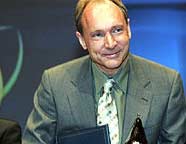Currently, many internet service providers, particularly in the United States, are charging varying fees for web access. However, Tim Berners-Lee, the director of the World Wide Web Consortium (W3C), argues that the Internet must always remain neutral and avoid fragmentation.
 |
Tim Berners-Lee. (Photo: AP) |
The two-tier system means that those willing to pay a certain amount to providers will have full access to certain network services and will be prioritized over others.
Berners-Lee warned at the International World Wide Web Conference (WWW2006), held from May 23 to May 26 in Edinburgh, Scotland, that if the U.S. continues down the path of a two-tier Internet, the global network will surely enter a “dark age.”
“To me, what is truly important is that there is only one web space,” Berners-Lee stated.
This British scientist developed the web in 1989 as an academic tool to help professionals share data. Since then, the Internet has expanded and impacted every aspect of life. However, as it has grown stronger, conflicting opinions have emerged about the direction of its development.
The World Wide Web Consortium (W3C) consistently advocates for an open model. In this model, everyone has equal access, and all data on the web is transmitted fairly and without bias. This view is supported by companies such as Microsoft and Google.
Meanwhile, American telecommunications companies do not accept this. They want to implement a two-tier system to allow organizations and companies willing to pay for priority access when retrieving information.
Berners-Lee is concerned that if this happens, broadband providers will become “gatekeepers” of web content; however, he remains optimistic that the two-tier trend will be difficult to establish.
T.N.




















































